How To Write A Complaint Letter About A Doctor
Dear Dr. [Last Name],
I am writing this letter to formally file a complaint regarding my recent experiences with your medical practice. I hope that by bringing these concerns to your attention, we can work towards a resolution and improve the quality of care provided.
On [date], I visited your clinic for a routine check-up and was highly dissatisfied with the level of service I received. Despite having made an appointment in advance, the wait time was excessively long, causing considerable inconvenience. Moreover, the lack of communication from the staff regarding the delay only added to my frustration.
During the consultation, I found your bedside manner to be dismissive and rushed. I felt that you did not take the time to listen to my concerns or adequately address my questions. This left me feeling unheard and undervalued as a patient.
Furthermore, I was disappointed with the lack of thoroughness in the examination process. It seemed as though you were in a hurry to move on to the next patient, as important aspects of my medical history were overlooked. As a result, I felt that the quality of care I received was subpar and did not meet the standard I expected from a medical professional.
I believe it is crucial for medical practitioners to provide attentive and compassionate care to their patients. It is disheartening to have experienced such a negative encounter under your care, as I had previously heard positive reviews about your practice.
I kindly request that you thoroughly review and address the issues raised in this letter. As a resolution, I would appreciate a written response from you, acknowledging the problems I encountered and outlining the steps you plan to take to prevent similar occurrences in the future. Additionally, I would like to discuss the possibility of arranging a follow-up appointment to address the concerns that were left unattended during my previous visit.
Please find attached copies of relevant documents, including receipts and appointment records, which support my complaint. If there is any further documentation or information you require, please let me know, and I will be happy to provide it.
I hope that we can resolve these matters amicably, ensuring that all patients receive the high standard of care they deserve. I look forward to hearing from you within [reasonable time frame, e.g., 14 days] to initiate a constructive conversation about these concerns.
Thank you for your attention to this matter. I trust that you will address my complaint promptly and professionally. Should you require any additional information, please do not hesitate to contact me at the above-mentioned contact details.
Sincerely,
[Your Name]
Remember to adapt this letter to your specific circumstances and include any additional relevant details.
What is a Complaint Letter About a Doctor and Why Write One?
A complaint letter about a doctor is a formal written document expressing dissatisfaction with medical care, professional conduct, or treatment received from a healthcare provider. The primary purposes include:
- Documenting incidents of substandard care, misdiagnosis, or unprofessional behavior
- Seeking resolution, apology, or corrective action from the medical facility or regulatory body
- Protecting other patients from similar experiences
- Creating an official record that may be needed for legal or insurance purposes
- Holding healthcare providers accountable to ethical and professional standards
- Requesting changes in treatment plans or requesting a different healthcare provider
Who Should Send This Letter?
- Patients who directly experienced unsatisfactory medical care or unprofessional treatment
- Legal guardians or parents writing on behalf of minors who received inadequate care
- Family members with power of attorney representing patients unable to advocate for themselves
- Caregivers authorized to make medical decisions for elderly or incapacitated individuals
- Patient advocates working within healthcare systems to resolve disputes
- Estate representatives addressing issues that affected a deceased patient's final care
To Whom Should This Letter Be Addressed?
The recipient depends on the severity and nature of the complaint:
- Hospital Administrator or Patient Relations Department for facility-based issues
- Medical Practice Manager for private practice concerns
- State Medical Board for serious violations of medical ethics or patient safety
- Insurance Companies when billing or coverage disputes relate to quality of care
- Healthcare Ombudsman for unresolved complaints within the system
- Professional Medical Associations when ethical violations are involved
- Legal Representatives when the complaint may lead to malpractice claims
When Should You Write This Letter?
Consider writing a complaint letter in these situations:
- After experiencing misdiagnosis that led to delayed treatment or worsening conditions
- When a doctor displays unprofessional behavior, rudeness, or dismissive attitudes
- Following medication errors or prescription mistakes
- After inadequate informed consent or lack of explanation about procedures
- When experiencing discrimination based on age, gender, race, or other factors
- After a doctor fails to follow up on test results or patient concerns
- When confidentiality or privacy has been breached
- Following unnecessary procedures or over-treatment
- After experiencing long wait times consistently without explanation
- When a doctor dismisses legitimate symptoms or refuses appropriate referrals
Formal Complaint to Medical Board
Subject: Formal Complaint Against Dr. [Doctor's Full Name], License #[License Number]
Dear Medical Board Director,
I am writing to file a formal complaint against Dr. [Doctor's Full Name], who practices at [Medical Facility Name and Address]. On [specific date], I received treatment that fell significantly below acceptable medical standards and violated patient care protocols.
During my appointment for [medical concern], Dr. [Last Name] [describe specific incident: failed to conduct necessary examinations, misdiagnosed my condition despite clear symptoms, prescribed medication without reviewing my medical history and allergies, etc.]. As a direct result of this negligence, I [describe consequences: suffered complications, required emergency treatment, experienced prolonged pain, etc.].
I have documentation supporting this complaint, including medical records from [date], witness statements from [if applicable], and subsequent treatment records from [other healthcare provider] that contradict Dr. [Last Name]'s assessment.
This complaint is submitted after attempting to resolve the matter directly with [medical facility name], which [describe response or lack thereof]. I believe this incident represents a serious breach of medical ethics and patient safety standards that requires investigation by the Medical Board.
I request that you investigate this matter thoroughly and take appropriate disciplinary action to prevent other patients from experiencing similar harm. I am available to provide additional information, testimony, or documentation as needed for your investigation.
Please acknowledge receipt of this complaint and inform me of the investigation timeline and any actions taken.
Sincerely,
[Your Full Name]
[Your Contact Information]
[Patient ID or Medical Record Number]
Professional Complaint to Hospital Administration
Subject: Patient Complaint Regarding Dr. [Doctor's Name] - Patient ID: [Your ID]
Dear Hospital Administrator,
I am writing to formally document my concerns regarding the care I received from Dr. [Doctor's Full Name] in the [Department Name] on [date]. While I appreciate the overall quality of your facility, this particular experience requires administrative attention.
The specific issues I encountered include:
First, Dr. [Last Name] arrived nearly two hours late for my scheduled appointment without any notification or apology, despite my having arrived on time for a procedure that required fasting.
Second, during the consultation, the doctor appeared distracted, frequently interrupted our conversation to check their phone, and failed to answer my questions about the proposed treatment plan adequately.
Third, I was not provided with complete informed consent regarding the risks and alternatives to the procedure recommended, which I later learned about from another healthcare provider.
I have been a patient at [Hospital Name] for [length of time] and have consistently received excellent care. This experience was notably different and has caused me to question whether I can continue treatment with Dr. [Last Name].
I am requesting that this matter be reviewed and that I be assigned to a different physician within the department. Additionally, I would appreciate confirmation that steps will be taken to ensure other patients receive the attentive, professional care that your facility is known for.
I am available to discuss this matter further and can be reached at [phone] or [email]. I look forward to your response within [reasonable timeframe, e.g., 10 business days].
Respectfully,
[Your Full Name]
[Date]
Serious Complaint Regarding Misdiagnosis
Subject: Urgent Complaint - Misdiagnosis by Dr. [Doctor's Name]
Dear [Patient Relations Director/Medical Director],
I am writing to report a serious case of misdiagnosis that has significantly impacted my health and wellbeing. On [date], I consulted Dr. [Doctor's Full Name] at [Medical Facility] regarding [symptoms]. Despite presenting clear symptoms of [actual condition], Dr. [Last Name] diagnosed me with [incorrect diagnosis] without conducting appropriate diagnostic tests.
For [time period], I followed the treatment plan for the incorrect diagnosis, which included [medications/procedures]. During this time, my actual condition, [correct diagnosis], progressed untreated, resulting in [specific health consequences: hospitalization, permanent damage, emergency surgery, etc.].
When I sought a second opinion from Dr. [Second Doctor's Name] at [Other Facility], the correct diagnosis was identified within [timeframe] through [appropriate tests]. Dr. [Second Doctor] expressed concern that the initial symptoms I presented to Dr. [First Doctor's Last Name] should have warranted immediate [specific tests or referrals] according to standard medical protocols.
This misdiagnosis has resulted in:
- [Physical consequences]
- [Financial burden from incorrect treatment and subsequent emergency care]
- [Emotional distress]
- [Time lost from work]
- [Any permanent effects]
I have enclosed copies of my medical records from both providers, which clearly demonstrate the discrepancy in diagnostic approach and care quality. I am requesting a full review of my case, an explanation of why standard diagnostic protocols were not followed, and information about what corrective measures will be implemented.
This matter requires immediate attention, and I expect a substantive response within seven business days. I am prepared to escalate this complaint to the State Medical Board if necessary.
Sincerely,
[Your Full Name]
[Contact Information]
[Dates of Service]
Heartfelt Letter About Dismissive Treatment
Subject: Complaint About Dismissive Care - Dr. [Doctor's Name]
Dear [Practice Manager/Patient Advocate],
I am writing with great disappointment to describe an experience that left me feeling unheard, dismissed, and ultimately harmed by the care I received from Dr. [Doctor's Name].
For months, I visited Dr. [Last Name] complaining of [specific symptoms]. Each time, I was told that my symptoms were "probably just stress" or "anxiety-related" without any diagnostic testing or thorough examination. As a [your gender/age], I felt that my concerns were not being taken seriously, and I was repeatedly sent home with advice to "relax more" and "exercise."
The breaking point came when [describe specific incident]. I knew something was genuinely wrong with my body, but I was made to feel as though I was overreacting or imagining my symptoms. The doctor's tone was condescending, and at one point, they suggested I "stop reading things on the internet."
Desperate for answers, I found another doctor who immediately ordered [appropriate tests], which revealed [actual diagnosis]. My new doctor was shocked that these basic tests had never been ordered and told me that my symptoms were "textbook" indicators of my condition.
I am not just frustrated—I am hurt. I trusted Dr. [Last Name] with my health, and that trust was violated. Every patient deserves to be heard and to have their concerns validated, even if the diagnosis ultimately proves to be minor. The dismissive attitude I experienced is unacceptable in healthcare.
I hope this letter prompts reflection and change so that other patients do not feel as invisible and invalidated as I did. Patients know their own bodies, and we deserve doctors who listen.
I would appreciate acknowledgment of this complaint and information about how patient concerns are being addressed within your practice.
With disappointment,
[Your Full Name]
[Date]
Complaint About Unprofessional Behavior
Subject: Unprofessional Conduct by Dr. [Doctor's Name]
Dear [Department Head/Clinic Director],
I am filing this complaint regarding unprofessional and inappropriate behavior exhibited by Dr. [Doctor's Full Name] during my appointment on [date] at [location].
During my visit, Dr. [Last Name] made several comments that were inappropriate and made me extremely uncomfortable. Specifically, [describe the unprofessional behavior: made personal comments unrelated to medical care, used inappropriate language, made discriminatory remarks, discussed other patients inappropriately, appeared to be under the influence, etc.].
This behavior is unacceptable in any professional setting, particularly in healthcare where patients are vulnerable and must trust their providers. I felt [uncomfortable, disrespected, unsafe, offended] and cut the appointment short because the environment had become inappropriate.
As a result of this experience, I am unwilling to continue treatment with Dr. [Last Name] and request immediate reassignment to another provider within your facility. I also believe this behavior warrants investigation to determine whether other patients have experienced similar treatment.
I have documented this incident with [notes taken immediately after, witness present, etc.] and am prepared to provide additional details if necessary. This type of conduct damages the patient-provider relationship and reflects poorly on your facility.
I expect a prompt response addressing how this matter will be handled and confirmation of my reassignment to a different doctor.
Sincerely,
[Your Full Name]
[Patient ID]
[Contact Information]
Formal Complaint About Privacy Violation
Subject: HIPAA Violation Complaint - Breach of Medical Privacy
Dear [Privacy Officer/Compliance Director],
I am writing to report a serious breach of my medical privacy by Dr. [Doctor's Full Name] that constitutes a violation of HIPAA regulations.
On [date], I discovered that Dr. [Last Name] [describe violation: discussed my medical condition with unauthorized individuals, left my records accessible to others, disclosed my diagnosis to family members without permission, posted about my case on social media, etc.].
I did not provide authorization for my medical information to be shared in this manner. The unauthorized disclosure included [specific information disclosed], which is protected health information under HIPAA.
This breach has caused me significant distress and [describe consequences: damaged personal relationships, affected employment, caused emotional harm, etc.]. Medical privacy is a fundamental patient right, and this violation has destroyed my trust in Dr. [Last Name] and potentially your facility.
I am requesting:
1. A full investigation into how this breach occurred
2. Written confirmation of what steps will be taken to prevent future violations
3. Notification of any disciplinary action taken against Dr. [Last Name]
4. Information about my rights to file a complaint with the Office for Civil Rights
I have documented evidence of this privacy violation, including [describe evidence]. This is a serious matter that may require legal action if not addressed appropriately.
I expect a response within five business days acknowledging receipt of this complaint and outlining the investigation process.
Sincerely,
[Your Full Name]
[Date]
[Contact Information]
Straightforward Complaint About Billing Issues Related to Care
Subject: Complaint Regarding Charges for Inadequate Care
Dear Billing Department and Patient Relations,
I am disputing charges on my account (Account #[number]) related to services provided by Dr. [Doctor's Name] on [date]. I am refusing to pay for care that was substandard and did not meet basic professional standards.
During my appointment, Dr. [Last Name] spent less than five minutes with me, did not conduct a physical examination despite my presenting symptoms, and prescribed medication without reviewing my medical history. The appointment I was charged for was supposed to be a comprehensive evaluation, but I received cursory attention at best.
I have been billed $[amount] for a service that was not adequately provided. I am requesting that this charge be removed from my account or significantly reduced to reflect the actual level of care received.
Additionally, I am filing a separate complaint about the quality of care with [appropriate department], but I wanted the billing department to be aware that I will not be paying for services that were not properly rendered.
Please review this matter and respond within 15 days with an adjusted bill or explanation. I am prepared to dispute this charge with my insurance company and through other channels if necessary.
Thank you for your attention to this matter.
[Your Full Name]
[Account Number]
[Date]
Follow-Up Complaint Letter
Subject: Follow-Up to Unresolved Complaint - Reference #[if provided]
Dear [Administrator/Director],
This letter serves as a follow-up to my initial complaint filed on [date] regarding Dr. [Doctor's Name]. To date, I have not received a response, or the response I received on [date] was inadequate to address the serious concerns I raised.
To summarize my original complaint: [brief description of main issues]. These are serious matters that affect patient safety and quality of care, yet [describe lack of response or inadequate response].
I am disappointed that [facility name] has not taken this complaint seriously. The lack of response suggests that patient concerns are not a priority, which is deeply troubling for a healthcare institution.
I am now escalating this matter and have [filed a complaint with the State Medical Board, contacted a patient advocate, consulted with legal counsel, etc.]. I am also providing copies of both this letter and my original complaint to [additional recipients].
I am giving you one final opportunity to address this matter appropriately before I proceed with formal external complaints. I expect a substantive response within five business days that includes a clear action plan for addressing the issues I have raised.
Patient safety and quality care should be your top priorities. Your handling of this complaint will determine whether I pursue further action through regulatory agencies and legal channels.
Sincerely,
[Your Full Name]
[Date]
[All previous reference numbers]
How to Write and Send a Complaint Letter About a Doctor
Writing an effective complaint letter requires a systematic approach:
- Document everything immediately after the incident while details are fresh, including dates, times, names, and specific statements made
- Gather supporting evidence such as medical records, test results, bills, appointment confirmations, and witness statements
- Determine the appropriate recipient based on severity and whether you want internal resolution or external investigation
- Use a clear, factual tone regardless of your emotions—stick to objective descriptions of what occurred
- Structure your letter chronologically so the reader can follow the sequence of events easily
- Specify desired outcomes such as policy changes, reassignment to another doctor, refunds, or formal investigation
- Keep copies of everything including the original letter, all supporting documents, and any responses received
- Send via certified mail or email with read receipt to ensure delivery can be proven
- Set reasonable deadlines for response, typically 10-14 business days for facility responses, longer for medical boards
- Follow the complaint escalation path starting internally before involving external regulatory bodies unless safety concerns require immediate external reporting
Requirements and Prerequisites Before Writing
Before drafting your complaint letter, ensure you have:
- Complete medical records from the appointment or treatment period in question, which you have a legal right to obtain
- Timeline documentation with specific dates and times of all relevant appointments and communications
- Written notes from immediately after problematic interactions while memory is accurate
- Evidence of attempts to resolve the issue informally if applicable, such as phone call logs or email exchanges
- Names and titles of all individuals involved, including the doctor, nurses, and administrative staff present
- Insurance information and billing statements if financial issues are part of the complaint
- Knowledge of facility complaint procedures by reviewing the patient handbook or website
- Understanding of your legal rights as a patient, including HIPAA protections and informed consent requirements
- Second medical opinion documentation if the complaint involves misdiagnosis or substandard treatment
- Witness contact information if others observed the incident and can provide corroborating statements
- Emotional readiness to engage in what may be a lengthy and potentially frustrating process
Formatting Your Complaint Letter
Proper formatting enhances credibility and ensures your complaint is taken seriously:
- Length: Aim for one to three pages—detailed enough to convey all relevant information but concise enough to maintain the reader's attention
- Tone: Professional and factual for medical board and administrative complaints; may be more personal for patient relations departments while remaining respectful
- Structure: Use clear paragraphs with each addressing a single issue or event; avoid walls of text
- Language: Be specific rather than using vague terms like "bad care"—describe exactly what was inadequate and why
- Format: Use standard business letter format with proper salutations, your contact information, and professional closing
- Emphasis: Bold or underline key points sparingly—overuse diminishes impact
- Attachments: Reference all supporting documents in the letter and include a numbered list of attachments
- Delivery method: Certified mail with return receipt for formal complaints to establish proof of delivery and response timeline
- Copies: Indicate at the bottom of the letter if copies are being sent to other parties (cc:)
- Avoid: Emotional language, profanity, threats, or exaggerations that undermine credibility
- Include: Patient ID numbers, dates of service, and reference numbers to help administrators locate your records quickly
Common Mistakes to Avoid
Protect the effectiveness of your complaint by avoiding these errors:
- Writing while angry without allowing time to calm down, resulting in emotional language that detracts from legitimate concerns
- Being vague about incidents—saying "the doctor was rude" without specific examples of what was said or done
- Exaggerating or lying about any details, which destroys credibility if discovered
- Including irrelevant information that dilutes the main complaint, such as grievances about parking or waiting room comfort
- Failing to specify desired outcomes, leaving the recipient unsure what would resolve your complaint
- Sending to the wrong party first—starting with the medical board when the facility hasn't had a chance to respond
- Making legal threats prematurely, which may cause the facility to cease communication and refer you to their legal department
- Omitting important dates and documentation, making it difficult for administrators to investigate your claim
- Submitting an anonymous complaint when you want follow-up action—most systems cannot respond without contact information
- Using multiple exclamation points or all caps, which appears unprofessional
- Copying too many parties initially, which can seem like grandstanding rather than genuine attempt at resolution
- Forgetting to keep copies of all correspondence for your records
- Missing deadlines for filing complaints with regulatory bodies—some have strict time limitations
Elements and Structure of an Effective Complaint Letter
Every complaint letter should include these essential components:
- Header information: Your contact details, date, recipient's name and title, and facility address
- Clear subject line: Brief description of complaint purpose and relevant identifiers (patient ID, dates of service)
- Opening statement: Concise explanation of why you're writing and what doctor/facility is involved
- Chronological narrative: Detailed account of events in the order they occurred with specific dates and times
- Specific concerns: Clear articulation of what was wrong—whether medical error, unprofessional conduct, or policy violation
- Impact statement: Explanation of how the incident affected you physically, emotionally, or financially
- Supporting evidence reference: Mention of attached documentation without overwhelming the main letter
- Previous resolution attempts: Brief description of any efforts to resolve the matter informally if applicable
- Desired outcome: Specific request for what you want to happen—investigation, apology, policy change, reassignment, or disciplinary action
- Timeline expectation: Reasonable deadline for response, typically 10-14 business days
- Professional closing: Courteous sign-off with your full name and signature
- Attachment list: Numbered list of all supporting documents enclosed
- CC notation: Indication if copies are being sent to other parties, when appropriate
After Sending Your Complaint Letter
Once you've submitted your complaint, these steps ensure proper follow-up:
- Confirm receipt within 2-3 business days if you haven't received automatic acknowledgment
- Document the submission by keeping copies of certified mail receipts, delivery confirmations, or email read receipts
- Wait the specified timeframe before following up—usually 10-14 business days for internal complaints, 4-6 weeks for medical boards
- Respond promptly to any requests for additional information or documentation
- Keep detailed records of all communications, including phone calls with notes about who you spoke with and what was discussed
- Evaluate the response carefully—does it adequately address your concerns or require further escalation?
- Escalate if necessary by filing complaints with external bodies like state medical boards, health departments, or patient advocates
- Consider legal consultation if the response is inadequate and the harm was significant
- Follow through on threatened actions if you stated you would escalate and received no satisfactory response
- Request written confirmation of any promised changes or policy implementations
- Update your medical records to reflect that you've filed a complaint if switching providers
- Share your experience through appropriate channels like hospital satisfaction surveys or healthcare review platforms after resolution
Advantages and Disadvantages of Filing a Complaint
Advantages:
- Creates official documentation of substandard care that may protect other patients
- May result in improved care, policy changes, or better provider training
- Provides avenue for receiving apology, explanation, or compensation
- Empowers patients to advocate for themselves and hold providers accountable
- Can lead to reassignment to a more suitable healthcare provider
- May identify systematic problems within a facility that need addressing
- Protects your legal rights if you later decide to pursue malpractice claims
Disadvantages:
- Time-consuming process that requires significant effort and documentation
- May damage relationship with the provider if you need to continue care at same facility
- No guarantee of satisfactory outcome or any outcome at all
- Can be emotionally draining to relive and document negative experiences
- Potential for retaliatory labeling as a "difficult patient" in medical records
- Medical boards and facilities may take months or years to investigate and respond
- May receive defensive or dismissive responses that increase frustration
- Could complicate insurance claims or ongoing treatment if poorly timed
Comparing Complaint Letters to Alternative Actions
Complaint Letter vs. Verbal Complaint:
- Written complaints create permanent records while verbal complaints may be forgotten or dismissed
- Letters allow you to carefully organize thoughts and include all relevant details
- Written format is required for formal investigations by regulatory bodies
- Verbal complaints may resolve minor issues faster through direct communication
Complaint Letter vs. Malpractice Lawsuit:
- Letters are appropriate for most concerns and don't require legal representation
- Lawsuits are reserved for serious harm with significant damages and require proof of negligence
- Complaint letters can be filed without affecting ability to sue later if needed
- Lawsuits are adversarial and costly; complaint letters seek resolution and improvement
Complaint Letter vs. Online Reviews:
- Letters go through official channels and can trigger investigations; reviews are public opinion
- Letters may result in actual policy changes; reviews primarily warn other patients
- Letters protect your privacy; reviews are public and permanent
- Complaint letters have legal protections; defamatory reviews can result in lawsuits against you
Complaint Letter vs. Switching Doctors:
- Simply switching providers doesn't address the underlying problem or protect other patients
- Complaint letters create accountability even if you do switch doctors
- Both actions together may be appropriate depending on severity of the issue
Tips and Best Practices
Maximize the effectiveness of your complaint with these strategies:
- Use the "24-hour rule": Draft your letter immediately but wait a day before sending to review with fresh perspective
- Lead with the most serious issue in cases involving multiple concerns to ensure it receives primary attention
- Quantify impact whenever possible—number of days suffering continued, amount of unnecessary medical bills, hours of lost work
- Reference medical standards or protocols that were violated if you've researched appropriate care standards
- Request specific individuals handle your complaint such as patient advocates or quality assurance directors rather than general administration
- Create a paper trail by sending follow-up emails summarizing any phone conversations
- Use "I" statements to describe your experience rather than attacking character—"I felt dismissed" vs. "The doctor is terrible"
- Research the doctor beforehand to see if other complaints exist publicly, which may strengthen your case
- Connect with patient advocacy groups who may provide templates, advice, or support through the process
- Know escalation paths before you need them—research your state medical board, health department, and insurance complaint processes
- Consider timing by avoiding filing complaints when you're in the middle of critical ongoing treatment that requires cooperation
- Be persistent but professional if initial responses are inadequate—calm persistence is more effective than aggressive demands
Does a Complaint Letter Require Attestation or Authorization?
Generally, complaint letters about doctors do not require notarization or official attestation. However, certain situations may require additional authorization:
- Medical records requests accompanying your complaint must include signed HIPAA authorization forms
- Complaints filed on behalf of others require legal documentation such as power of attorney, guardianship papers, or parental rights proof
- State medical board complaints may require sworn statements or affidavits in cases of serious allegations
- Legal proceedings that stem from complaints will require notarized documents and possibly depositions
- Insurance-related complaints may need signed authorization for the insurance company to investigate
- Third-party complaints (family members complaining about care given to a patient) need the patient's written permission to access protected health information
For standard complaints to hospital administration or patient relations departments, your signature and contact information are sufficient authorization to investigate your own care.

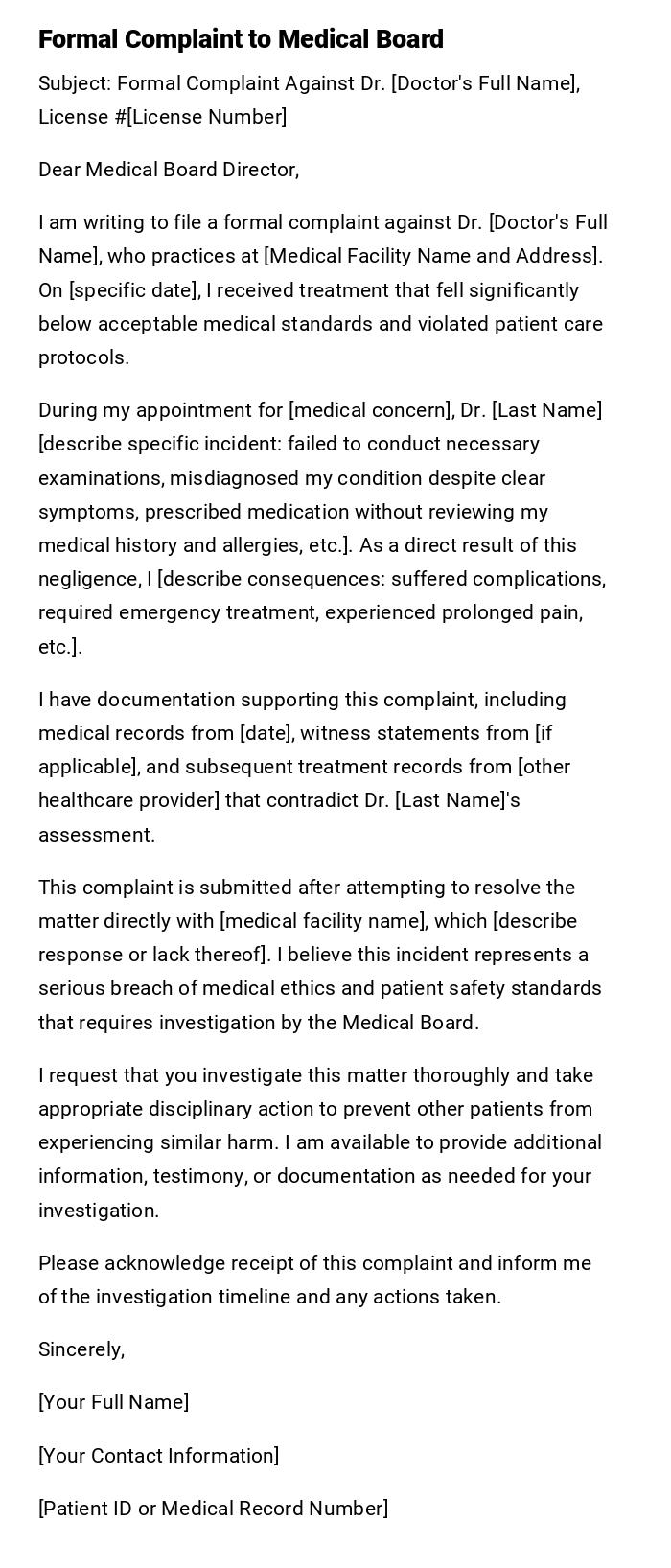
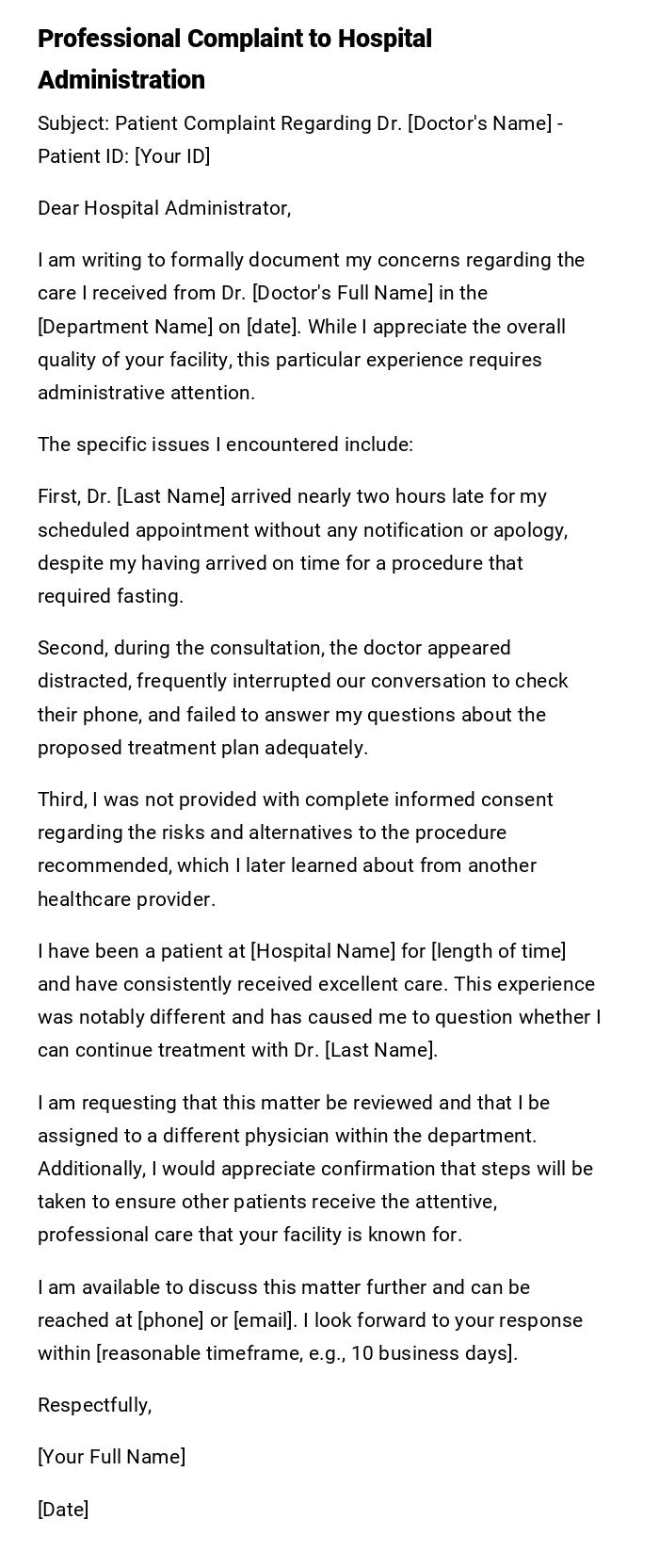
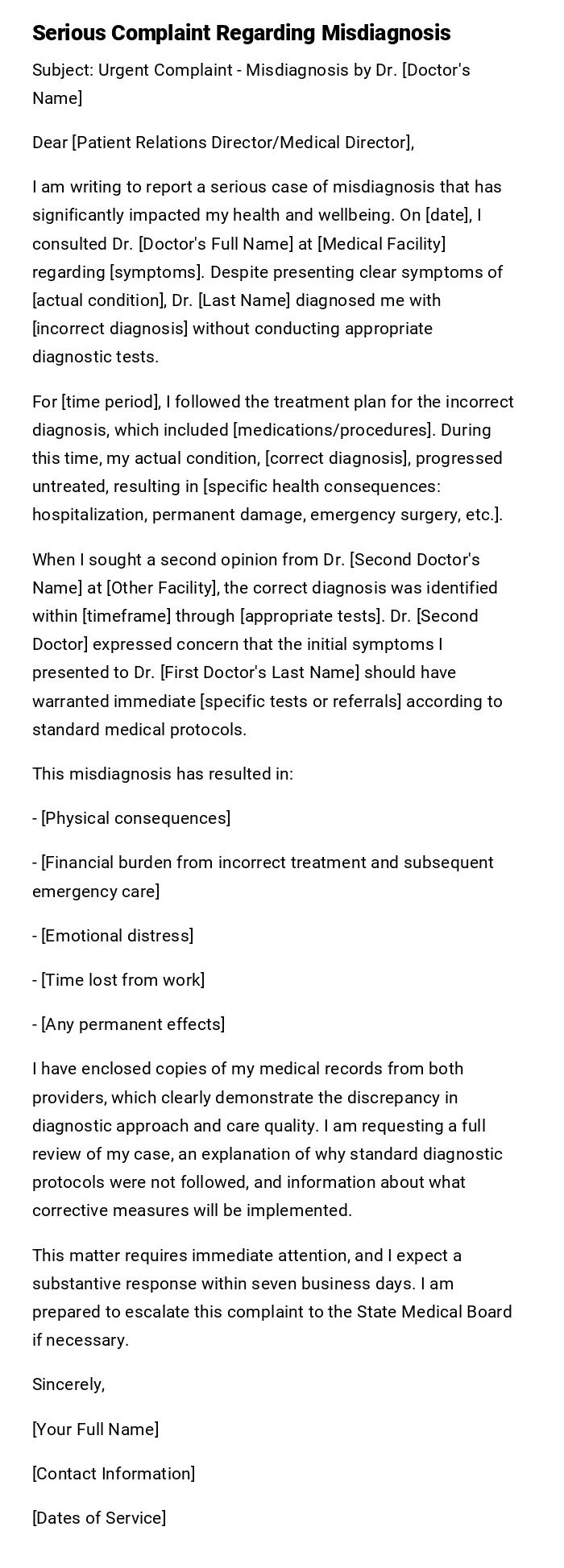
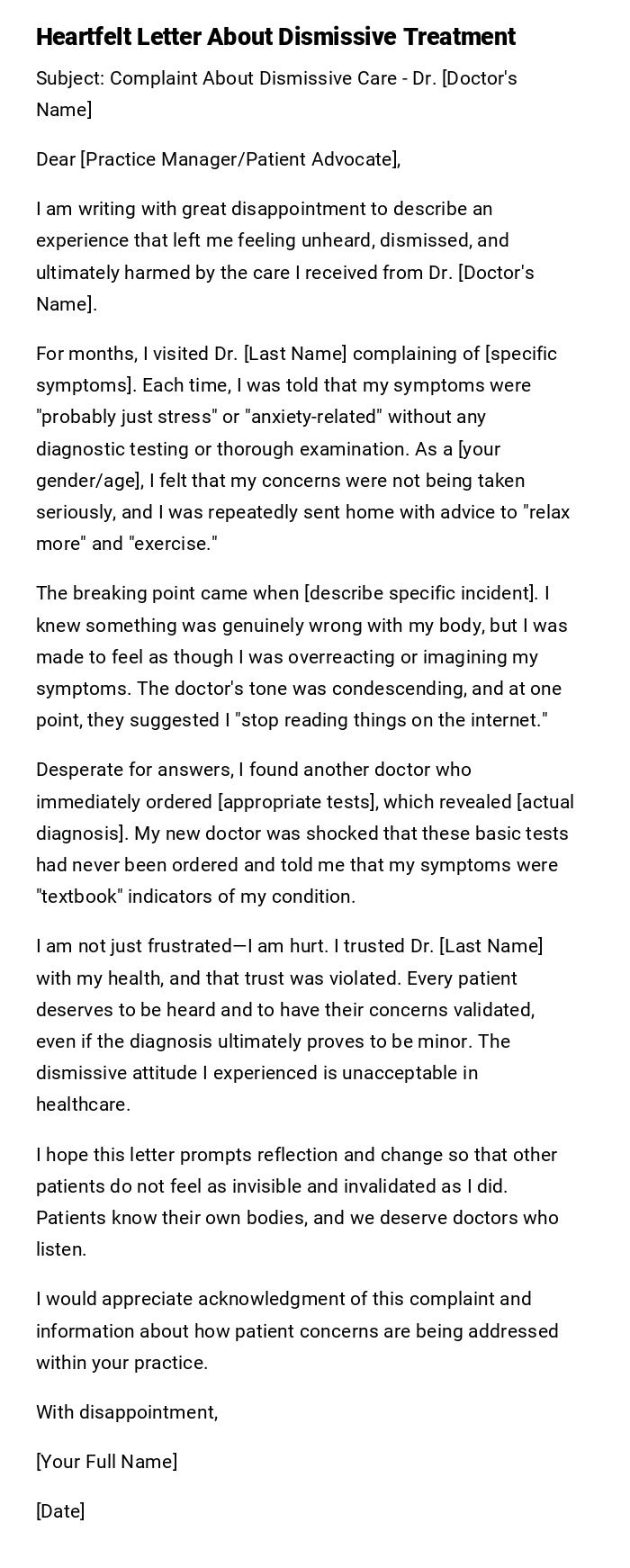
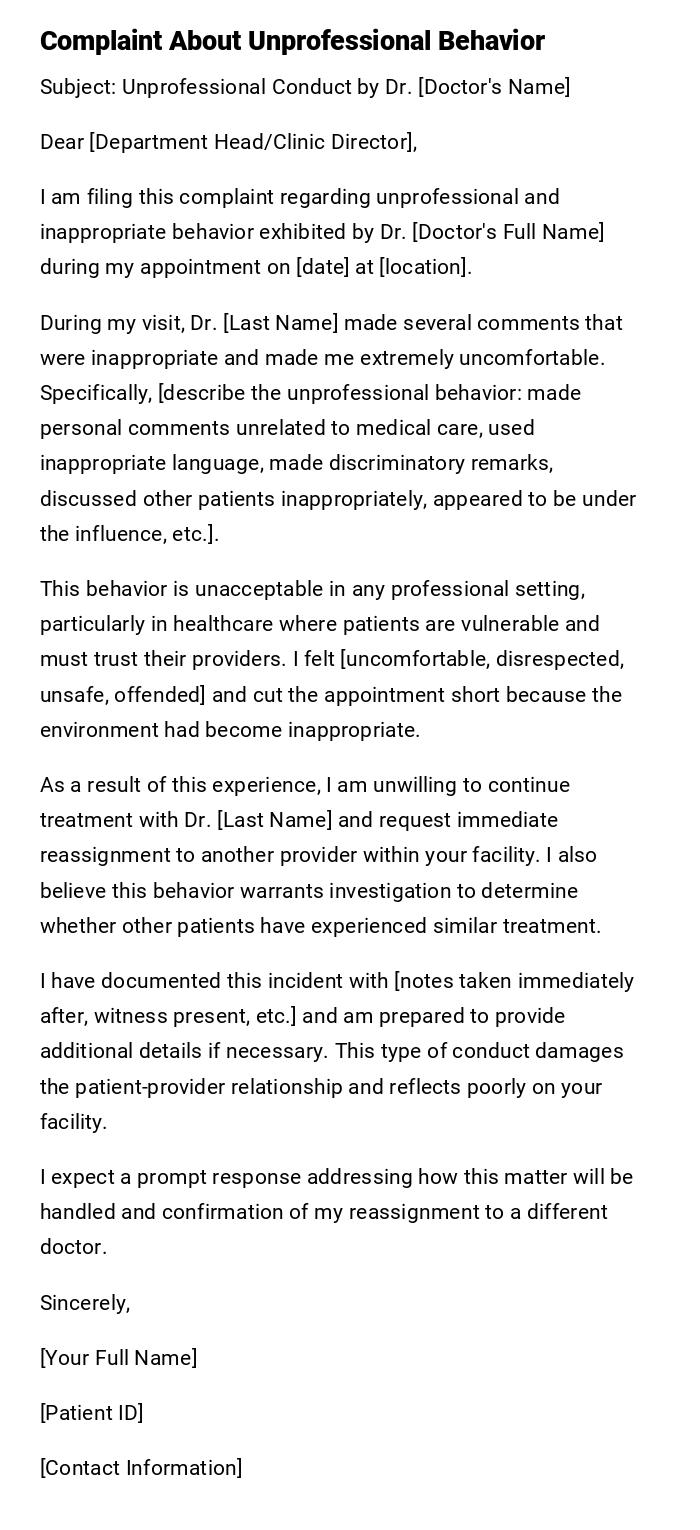
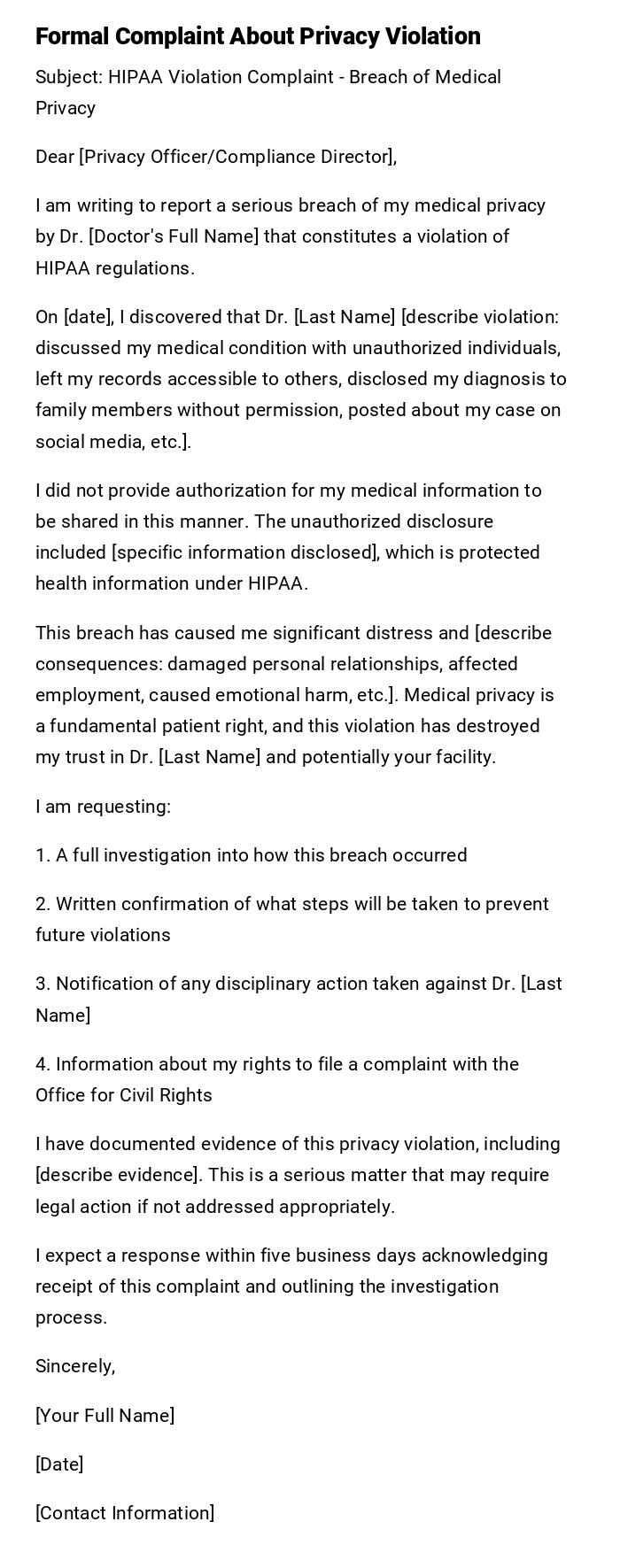
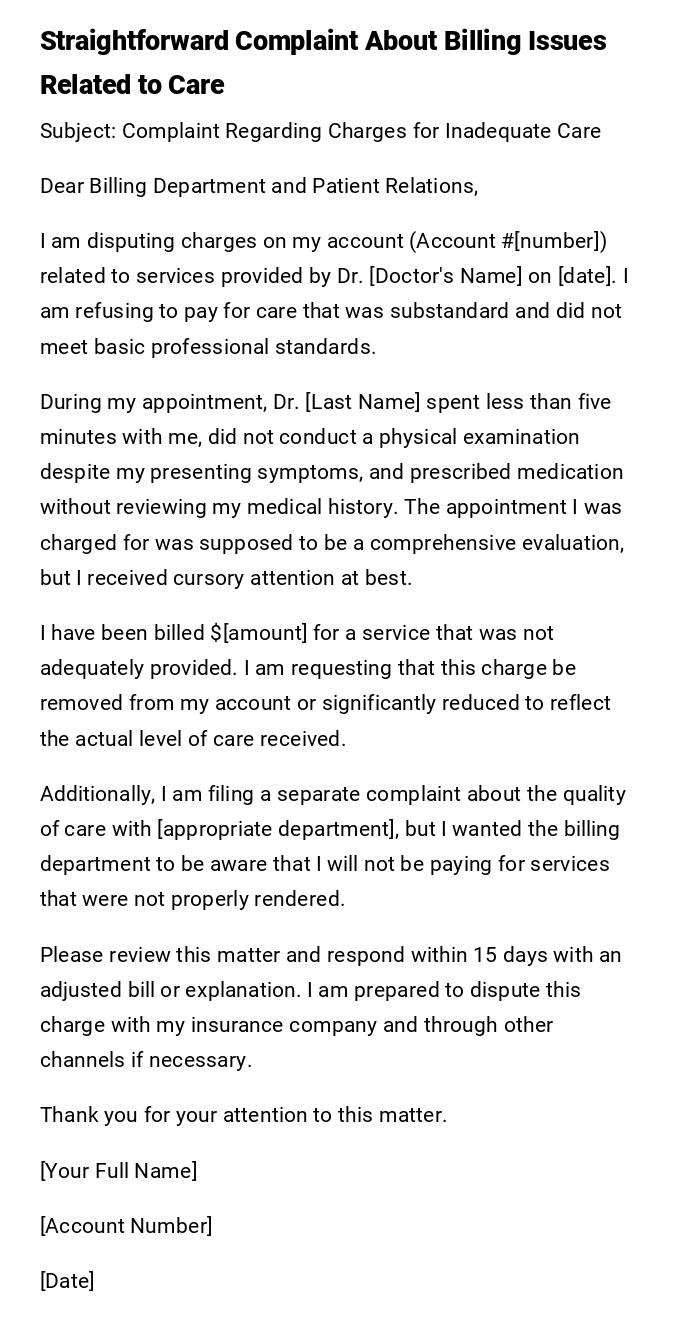
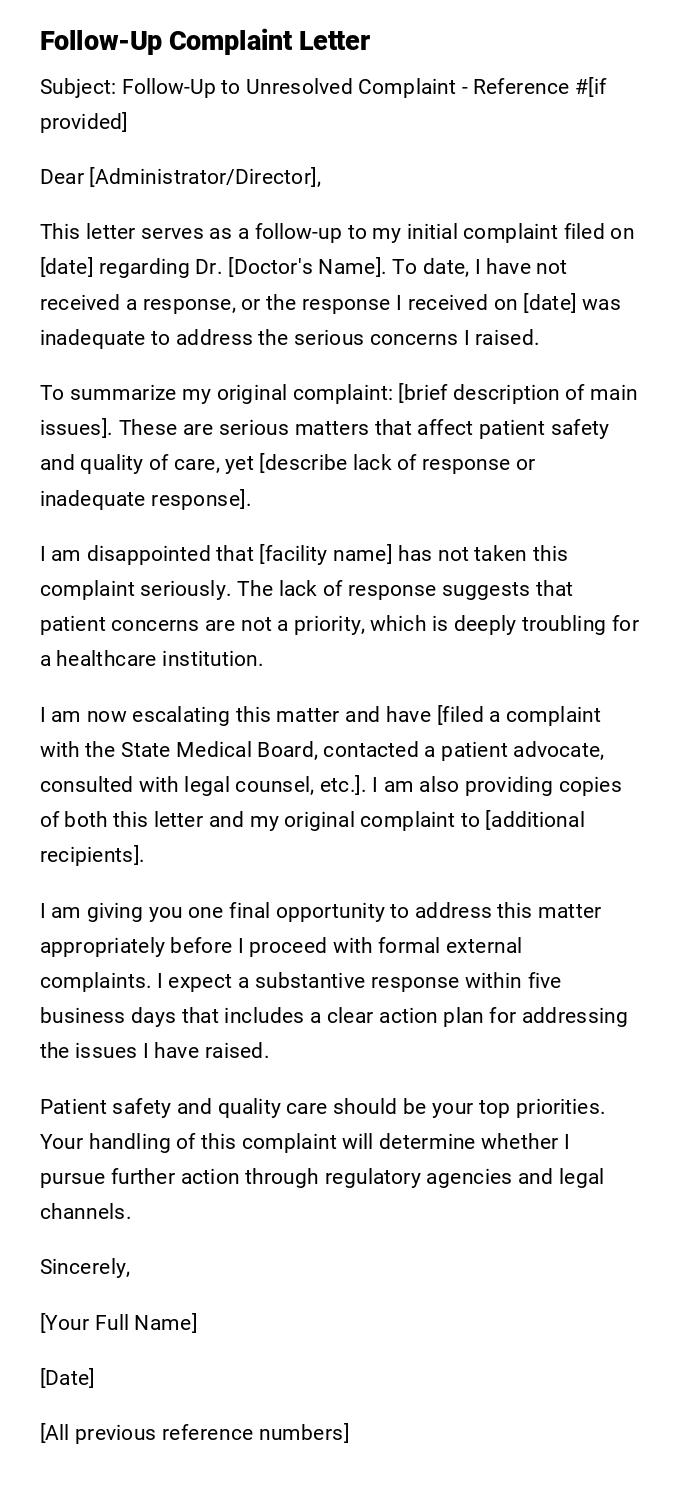

 Download Word Doc
Download Word Doc
 Download PDF
Download PDF